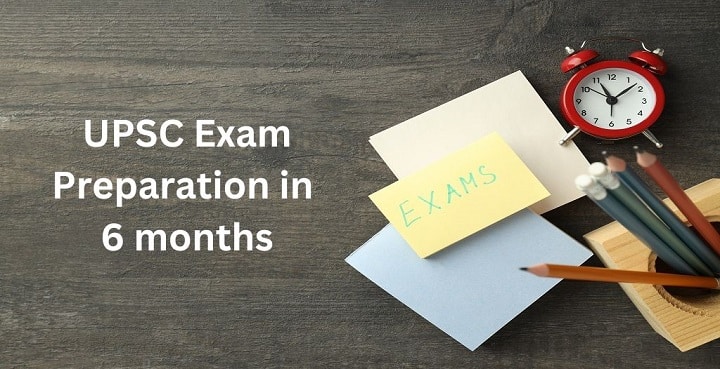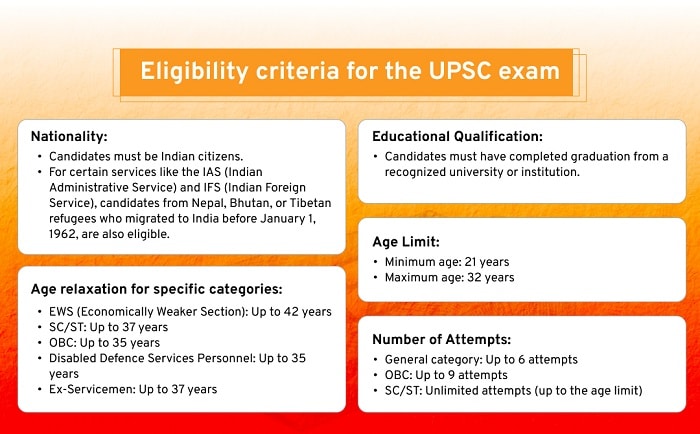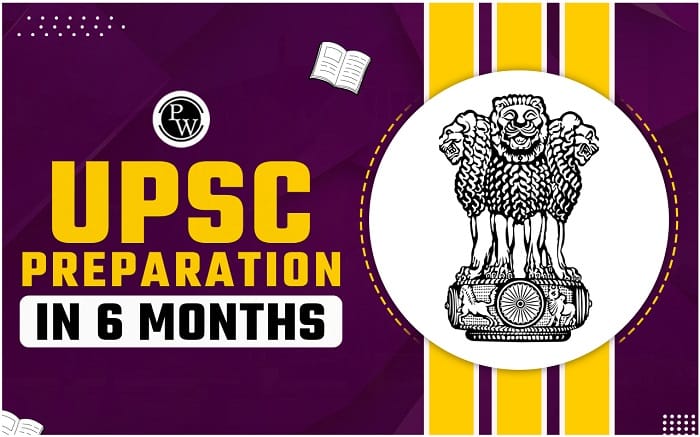
Table of Contents
ToggleUnderstanding the UPSC Exam Structure

Before diving into the study plan, it’s crucial to understand the structure of the UPSC Civil Services Examination (CSE), which consists of three stages:
- Preliminary Examination (Prelims): Objective-based with two papers – General Studies I and CSAT (Civil Services Aptitude Test).
- Main Examination (Mains): Descriptive-based with nine papers, covering a wide range of subjects.
- Personality Test (Interview): Evaluates personality, problem-solving skills, and knowledge on current issues.
With this six-month timeline, your primary focus will be on preparing for both Prelims and Mains. A robust and comprehensive approach is essential as you aim to clear both stages confidently.
Building a Solid 6-Month Study Plan
A six-month study plan for UPSC preparation requires structure, discipline, and regular assessment. Here’s how you can break down each month for effective preparation:
Month 1: Laying the Foundation
- Understand the Syllabus: Go through the UPSC syllabus for both Prelims and Mains. Make a list of core topics for General Studies and optional subjects.
- Choose Your Optional Subject: Research and select an optional subject that aligns with your strengths and interests, as it carries a significant weight in the Mains examination.
- Gather Resources: Collect standard textbooks, UPSC previous year papers, and reliable sources for current affairs. NCERT books for Classes 6–12 are essential for basic concepts.
- Focus Areas: Begin with fundamental subjects such as History, Geography, and Polity.
Month 2: Strengthening Core Concepts
- Daily Newspaper Reading: Start reading newspapers like The Hindu or Indian Express for current affairs. Make notes on important national and international events.
- Start Answer Writing Practice: Develop the habit of writing structured answers. Focus on clarity, coherence, and the ability to present facts concisely.
- Cover Key Subjects:
- Polity: Read Laxmikanth’s Indian Polity for a solid understanding.
- Geography: Refer to NCERT books and G.C. Leong’s Certificate Physical and Human Geography.
- Mock Tests: Attempt weekly tests to check your understanding of covered topics and to improve time management.
Month 3: Broadening Knowledge and Practicing Questions
- CSAT Preparation: Spend some time each day practicing reasoning and quantitative aptitude, as CSAT is qualifying but essential to clear Prelims.
- Focus on Economics and Environment:
- Economics: Read NCERT and Ramesh Singh’s Indian Economy. Understand basic economic concepts and current economic issues.
- Environment: Refer to Shankar IAS Environment book and stay updated on environmental issues in news.
- Writing Practice: Increase the frequency of answer writing, focusing on structuring your thoughts for the Mains exam.
- Revision and Mock Tests: Continue to revise previously covered topics and take more mock tests, especially on Polity and Geography.
Creating a Balanced Daily Routine
A balanced routine is key to maintaining focus and preventing burnout. Here’s a suggested daily routine:
| Time | Activity |
|---|---|
| 6:00 AM | Wake up, light exercise/meditation |
| 7:00 AM – 9:00 AM | Study General Studies topic |
| 9:00 AM – 9:30 AM | Breakfast |
| 9:30 AM – 12:30 PM | Study optional subject |
| 12:30 PM – 1:30 PM | Lunch and break |
| 1:30 PM – 4:00 PM | Current affairs and newspaper reading |
| 4:00 PM – 5:00 PM | CSAT practice |
| 5:00 PM – 6:00 PM | Revision and short break |
| 6:00 PM – 8:00 PM | Mock tests or answer writing practice |
| 8:00 PM – 9:00 PM | Dinner and relaxation |
| 9:00 PM – 10:30 PM | Light reading or review of the day’s work |
This schedule can be adapted based on personal preferences, but maintaining consistency in study hours is crucial.
Also Read: Wayne Dawson Bio
Essential Study Materials and Resources

Here is a list of recommended resources that cover essential topics for UPSC:
- Polity: Indian Polity by M. Laxmikanth
- History: India’s Ancient Past by R.S. Sharma, Modern India by Bipan Chandra
- Geography: NCERT books, Certificate Physical and Human Geography by G.C. Leong
- Economics: NCERT Economics, Indian Economy by Ramesh Singh
- Environment: Environment by Shankar IAS
- Current Affairs: The Hindu or Indian Express newspapers, Yojana and Kurukshetra magazines
Mastering Current Affairs
The UPSC places high importance on current affairs, and it’s essential to stay updated on key national and international events.
- Daily Newspaper Reading: Spend at least one hour every day reading newspapers.
- Note-Making: Write down only important points related to UPSC-relevant topics. Use a digital tool or maintain a notebook.
- Monthly Magazine: Use monthly magazines like Yojana, Kurukshetra, and other UPSC-focused publications to stay current.
- Mock Tests on Current Affairs: Weekly or monthly current affairs mock tests can help gauge your retention of information.
Revising and Reinforcing Knowledge
Revision is essential for UPSC preparation, given the vast syllabus and the conceptual depth required. Set aside time each week to review topics covered.
- Use Mind Maps and Charts: Visual aids can help retain information more effectively.
- Frequent Revision: Revisiting each subject at regular intervals (e.g., bi-weekly or monthly) will help you remember and apply information under test conditions.
- Mock Tests for Revision: Make sure to analyze your mistakes in every mock test and improve in weak areas.
Building Answer Writing Skills for Mains
Writing is an integral part of the Mains exam, where you’ll be expected to write detailed, analytical answers within a limited time. Here’s how you can improve your answer-writing skills:
- Practice Daily: Dedicate at least 30-40 minutes to write answers to previous years’ questions or sample questions.
- Follow a Structure: Practice structuring answers with an introduction, body, and conclusion. Make sure to be precise and relevant.
- Focus on Clarity: Clarity of thought and language is essential. Avoid using overly complex words and stick to facts.
- Analyze Feedback: If possible, join a test series that provides feedback on your answers. Constructive feedback can help you improve your writing style.
Time Management and Mock Tests
Mock tests are crucial for both Prelims and Mains as they familiarize you with the exam pattern and time constraints.
- Weekly Prelims Mock Tests: Simulate real exam conditions by taking full-length Prelims tests every weekend. Analyze your performance to identify weak areas.
- Subject-Specific Mains Tests: Focus on taking subject-specific tests for Mains, especially for your optional subject and General Studies papers.
- Analyze and Improve: Evaluate each test thoroughly, focusing on errors and areas where you can improve.
Handling Stress and Staying Motivated
Preparing for UPSC in six months can be intense, and it’s essential to take care of your mental well-being.
- Stay Physically Active: Regular exercise, even for just 20 minutes a day, can help reduce stress and improve focus.
- Take Short Breaks: Integrate short breaks between study sessions to recharge.
- Stay Connected with Supportive Peers: Join online study groups or interact with friends who are also preparing for UPSC. Positive support can boost morale.
- Keep the End Goal in Mind: Remind yourself why you’re pursuing this path and visualize your success to stay motivated.
Last Month Preparation and Final Revision
The last month is crucial as it’s your final chance to strengthen knowledge, revise thoroughly, and fine-tune strategies.
- Intensive Revision: Focus primarily on revision, particularly for the Prelims topics and high-weight Mains subjects.
- Current Affairs Consolidation: Go through all current affairs notes and monthly magazines.
- Mock Tests: Increase the frequency of mock tests, simulating real exam conditions. Aim for 2-3 tests per week.
- Stay Calm: Avoid any new topics in the final weeks. Stay focused on revision and practice, ensuring you’re well-rested and prepared.
Preparing for the UPSC in six months is ambitious but achievable with a structured plan, discipline, and perseverance. By focusing on essential topics, consistent answer writing, and frequent revision, you can maximize your chances of clearing the UPSC CSE. Stay focused, trust in your hard work, and believe in your abilities. Good luck on this challenging yet rewarding journey to civil service!





